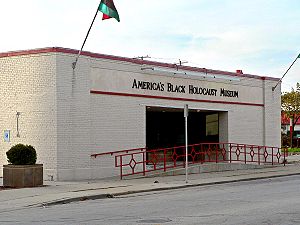
America's Black Holocaust Museum
Encyclopedia

Milwaukee, Wisconsin
Milwaukee is the largest city in the U.S. state of Wisconsin, the 28th most populous city in the United States and 39th most populous region in the United States. It is the county seat of Milwaukee County and is located on the southwestern shore of Lake Michigan. According to 2010 census data, the...
was the only memorial dedicated specifically to the victims of the enslavement of Africans in the United States
United States
The United States of America is a federal constitutional republic comprising fifty states and a federal district...
. It was founded by James Cameron
James Cameron (civil-rights activist)
James Cameron , not to be confused with the film director of the same name, was an American civil rights activist. In the 1940s, he founded three chapters of the National Association for the Advancement of Colored People . He also served as Indiana's State Director of the Office of Civil...
, America's last living survivor of a lynching
Lynching
Lynching is an extrajudicial execution carried out by a mob, often by hanging, but also by burning at the stake or shooting, in order to punish an alleged transgressor, or to intimidate, control, or otherwise manipulate a population of people. It is related to other means of social control that...
.
Cameron died in 2006; in 2008, the museum's board of directors announced that the museum would be closed temporarily because of financial problems. It has not re-opened since.
History
After surviving a lynching attempt and prison, starting at age 16, James Cameron became determined to change his life. He got an education, worked hard, and studied all his life about slavery and the African-American experience in the United States. He worked in civil rights, wrote independent articles, and collected materials having to do with African-American history. After retirement, James Cameron and his wife visited Yad VaShem in Israel. He thought that the focus on the personal history of individuals and their stories, rather than on numbers and processes, led to a better understanding of the reality of the Holocaust. Then living in Milwaukee, WisconsinMilwaukee, Wisconsin
Milwaukee is the largest city in the U.S. state of Wisconsin, the 28th most populous city in the United States and 39th most populous region in the United States. It is the county seat of Milwaukee County and is located on the southwestern shore of Lake Michigan. According to 2010 census data, the...
, in 1988 Cameron founded the museum, with the help of philanthropist Daniel Bader. He had been collecting materials on the African-American experience in the US for many years.
Mission
America’s Black Holocaust Museum (ABHM) existed to educate the public of injustices suffered by people of African American heritage, while providing visitors with an opportunity to rethink their assumptions about race and racism.Educational focus
While there is also a Black Holocaust memorial in Savannah, GeorgiaSavannah, Georgia
Savannah is the largest city and the county seat of Chatham County, in the U.S. state of Georgia. Established in 1733, the city of Savannah was the colonial capital of the Province of Georgia and later the first state capital of Georgia. Today Savannah is an industrial center and an important...
, the ABHM served as a center for education and scholarship related to the Black Holocaust and as a non-threatening forum for sharing thoughts about race and racism in America.
Exposing visitors to historical aspects of African American cultural identity was achieved through educational exhibits, special programming, and guided tours related to six distinct historic eras:
- Before Captivity in AfricaAfrican slave tradeSystems of servitude and slavery were common in many parts of Africa, as they were in much of the ancient world. In some African societies, the enslaved people were also indentured servants and fully integrated; in others, they were treated much worse...
- The Middle PassageMiddle PassageThe Middle Passage was the stage of the triangular trade in which millions of people from Africa were shipped to the New World, as part of the Atlantic slave trade...
- Slavery in the Americas
- Reconstruction era of the United States
- Civil RightsCivil rightsCivil and political rights are a class of rights that protect individuals' freedom from unwarranted infringement by governments and private organizations, and ensure one's ability to participate in the civil and political life of the state without discrimination or repression.Civil rights include...
- Modern Day Injustices
ABHM welcomed visitors of all races and backgrounds, and encouraged community understanding of the nation’s history of racism, prejudice, social change and cross-cultural understanding.

